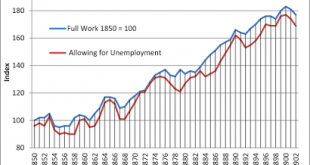The expression “Engels’ Pause” was coined by Robert C. Allen and refers to the period of real wage stagnation or low real wage growth in Britain in the early 19th century from about 1800 to 1840, even when real per capita GDP was rising in an historically unprecedented manner. You can see the “pause” in the graph of historical British real wages and per capita GDP per worker here.First, it is important to note that some economic historians have challenged the data on GDP and real wages in...
Read More »Marx’s “Law of Value” in Volume 1 of Capital
Labour value in volume 1 of Capital is defined in the following passages: “A use-value, or useful article, therefore, has value only because human labour in the abstract has been embodied or materialised in it. How, then, is the magnitude of this value to be measured? Plainly, by the quantity of the value-creating substance, the labour, contained in the article.” (Marx 1906: 45).“Since the magnitude of the value of a commodity represents only the quantity of labour embodied in it, it follows...
Read More »Marx’s Capital, Volume 1, Chapter 10: A Critical Summary
Chapter 10 of volume 1 of Capital is called “The Working Day” (Marx 1990: 340), and it deals with aspects of the working day in capitalism.Marx divides the chapter into seven sections: (1) The Limits of the Working Day;(2) The Voracious Appetite for Surplus Labour;(3) Branches of English Industry without Legal Limits to Exploitation(4) Day-Work and Night-Work. The Shift System(5) The Struggle for a Normal Working Day(6) The Struggle for a Normal Working Day. Laws for the Compulsory...
Read More »“Socially Necessary Labour Time is the only Source of Value”: What Does this even Mean?
The following proposition is asserted as true by Marxists (e.g., Foley 1986: 16): Proposition 1: Socially necessary labour time is the only source of value. Marx asserted this numerous times, though not necessarily in these words, and here are some examples: “A use-value, or useful article, therefore, has value only because human labour in the abstract has been embodied or materialised in it. How, then, is the magnitude of this value to be measured? Plainly, by the quantity of the...
Read More »Rudolf Hilferding on the Law of Value in Volume 1 of Capital
In 1904, Rudolf Hilferding wrote a response to Böhm-Bawerk (1896) called “Böhm-Bawerk’s Criticism of Marx” (Hilferding 1949 [1904]).In this essay of Hilferding, we have a fascinating confirmation of the way in which the early Marxists were concerned to still vindicate the law of value in volume 1 of Capital – the idea that commodities tend to exchange at pure labour values – as an empirical theory.Like Engels, they seized on Marx’s statement in Chapter 10 of volume 3 of Capital as follows:...
Read More »The Historical Development of Marxist Interpretations of the Law of Value
In essence, after Marx and Engels’ death Marxists held various positions, as follows: (1) The law of value in volume 3 of Capital Many Marxists followed volume 3 of Capital and gave up the view that commodity prices tend to equal pure labour values (which was the theory in volume 1). Instead, they defended the view of volume 3 that the “law of value” only ultimately and indirectly explains prices, and defended Marx’s three aggregate equalities: (1) the sum of surplus value = sum of...
Read More »Robert Skidelsky: Lecture 5: Distribution as a Macroeconomic Problem
Here Skidelsky gives lecture 5 of a series at the University of Warwick on economics. This lecture concerns distribution and macroeconomics.[embedded content]
Read More »Robert Wilbrandt’s Interpretation of Marx’s Law of Value in Volume 1 of Capital
The socialist German economist Robert Wilbrandt (1875–1954), the author of Karl Marx: versuch einer Würdigung (Leipzig, 1920), had an interesting interpretation of the “law of value” in volume 1 of Capital, as described by Alexander Gray: “Professor Wilbrandt, in his very sensitive appreciation of Karl Marx, offers us two points which are of some interest towards an appreciation of what Marx's admirers think that Marx really meant. The first is a rather naive admission that the first Volume...
Read More »Robert Skidelsky: Lecture 4: Banking Reform
Here Skidelsky gives lecture 4 of a series at the University of Warwick on economics. This lecture concerns banks and banking reform.[embedded content]
Read More »Engels’ Understanding of the “Law of Value” in the Anti-Dühring
In Friedrich Engels’ Herr Eugen Dühring’s Revolution in Science (1894; first published in 1878), he describes the “law of value” in two passages: “The feudal middle ages also developed in its womb the class which was destined in the future course of its evolution to be the standard-bearer of the modern demand for equality: the bourgeoisie. Itself in its origin one of the ‘estates’ of the feudal order, the bourgeoisie developed the predominantly handicraft industry and the exchange of...
Read More » Socialdem. 21st Century
Socialdem. 21st Century

